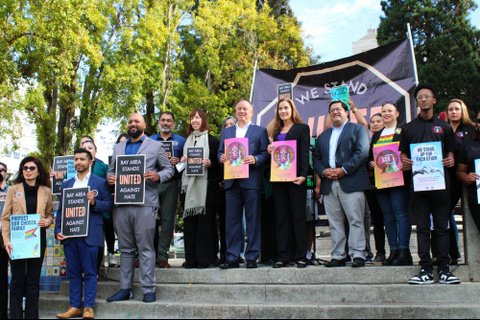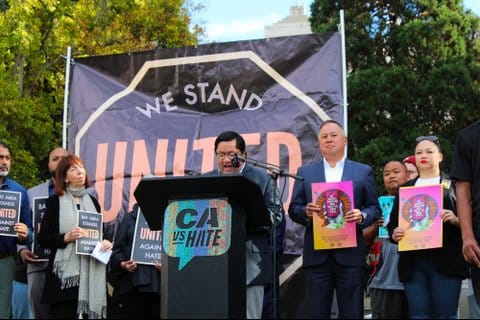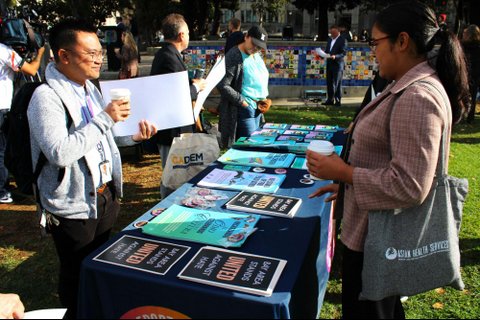
16 Nov Sixth Annual United Against Hate Week Kicks Off in Berkeley

Joining government and advocacy leaders at the United Against Hate Week launch in Berkeley were young people from around the state who recently gave testimonials about their experiences with hate during a public forum held at the Japanese American National Museum.
Story and photos by Joe Porrello | Video by Paul Billingsley
United Against Hate Week began its sixth annual rendition with community and government leaders gathering Monday in Berkeley to speak on the rise of hate crimes in California.
About 100 people were on hand for the California Civil Rights Department press conference held in partnership with the city of Berkeley; CA vs Hate, the state’s new platform for reporting hate crimes and incidents; and Not In Our Town, a group using filmmaking to combat hate.
According to the CCRD, hate crimes in California have reached their highest levels since 2001 and jumped more than 20% from 2021 to 2022.
Hate crimes are often underreported for a number of reasons. Berkeley Mayor Jesse Arreguín attributed part of the rise in hate crimes to more accurate statistics, courtesy of better and more abundant outlets to report them.
UAHW originally formed in response to Bay Area white supremacist rallies in 2017; one happened at Martin Luther King Jr. Civic Center Park in Berkeley where Monday’s event took place.
The week is part of a call to action to put an end to and raise awareness of hate and discrimination, with events like film screenings, workshops, marches and poetry slams around the state.
“We need to send a message that there are many more of us who have a message of love and peace than the fringes who are focused on hate,” said state Assemblymember Phil Ting, D-San Francisco, at the press conference. “We are not allowing those who are the haters to put us in our homes, to keep us down and make sure that we stay silent.”
- Berkeley Mayor Jesse Arreguín spoke at the lectern first Monday. “We encourage everyone to use this week as an inspiration for actions in your communities to galvanize change,” he said, adding UAHW grows every year, receiving new supporters from different California jurisdictions.
Arreguín told the Pulse he wants to see the fight against hate become a permanent fixture.
“We can’t just be focusing on this issue one week a year; this needs to be a yearlong call to action,” he said.
California has been at the forefront of state funding for initiatives assisting hate targets — to a historic degree.
“I’m really proud to be part of a state that prioritizes combating hate, and I think today’s event was particularly important,” Becky Monroe, deputy director of strategic initiatives and external affairs at the CCRD, told the Pulse.
Speakers focused heavily on the strategy of CA vs Hate, which hosts a non-emergency hate crime and incident reporting hotline available by phone or online that officially launched in May.
View this post on Instagram
Arreguín called the hotline “a huge step forward.”
“It’s needed now more than ever,” he told the Pulse. “Oftentimes, people feel like they’re by themself, that there’s no place to go when a hate crime or hate incident happens.”
Monroe said it’s important for those who feel unsafe about reporting hate crimes to law enforcement to know there is a resource they can feel at ease using.
“In this moment of conflict abroad…we must continue to work together to earn and keep that trust,” she said.
For those not comfortable using the hotline, CA vs Hate is working with advocates to find alternatives that victims find safe like LGBTQ+ centers and places of worship.
Through the initiative, victims and witnesses of hate can make reports in over 240 languages, and receive coordination care services like direct and ongoing counseling as well as legal aid.
Monroe pointed to the addition of “incidents” of hate that can be reported — along with hate crimes — as a way to provide more defense to victims. She noted hate incidents often violate civil rights and cause significant harm despite not being illegal.
In preliminary data from CA vs Hate representing three-fourths of California counties and 513 hotline users, the most common reason for hate events reported is race (27%).
“We will not be afraid. We will not back down,” said California-Hawaii NAACP President Rick L. Callender.
- Following hate-fueled rallies in the Bay Area in 2017, thousands of posters saying the “Bay Area Stands United Against Hate,” began popping up in places like home windows, and they were offered at the United Against Hate Week launch event.
UAHW has suggestions on ways to combat hate on its website that can be done when the week is over such as gathering people you know to practice standing up to bigotry and holding conversations about hate or holding a unity walk or student rally.
Monroe feels youth are instrumental in the battle against bigotry.
“Young people are very good at coming together across communities to support each other,” she told the Pulse, adding that CA vs Hate is trying to ensure students know their rights and are aware of support available to them.
The power of unity is something Monroe feels also proves crucial.
“In the face of the sorrow and fear in our communities, our greatest tool against hate is each other,” she said. “This is a week of action where we recommit to working together, reckoning with our history, and building stronger communities for all.”
Just as the sun shined unexpectedly and provided warmth on a mid-November day to begin UAHW, advocacy leaders hope their efforts similarly bring light to the fight against hate, produce pleasantly surprising results, and give comfort to survivors.
Reports can be made anonymously by calling (833) 866-4283, or 833-8-NO-HATE, Monday to Friday from 9 a.m. to 6 p.m. PT or online at any time.
This resource is supported in whole or in part by funding provided by the State of California, administered by the California State Library in partnership with the California Department of Social Services and the California Commission on Asian and Pacific Islander American Affairs as part of the Stop the Hate program. To report a hate incident or hate crime and get support, go to CA vs Hate.








No Comments